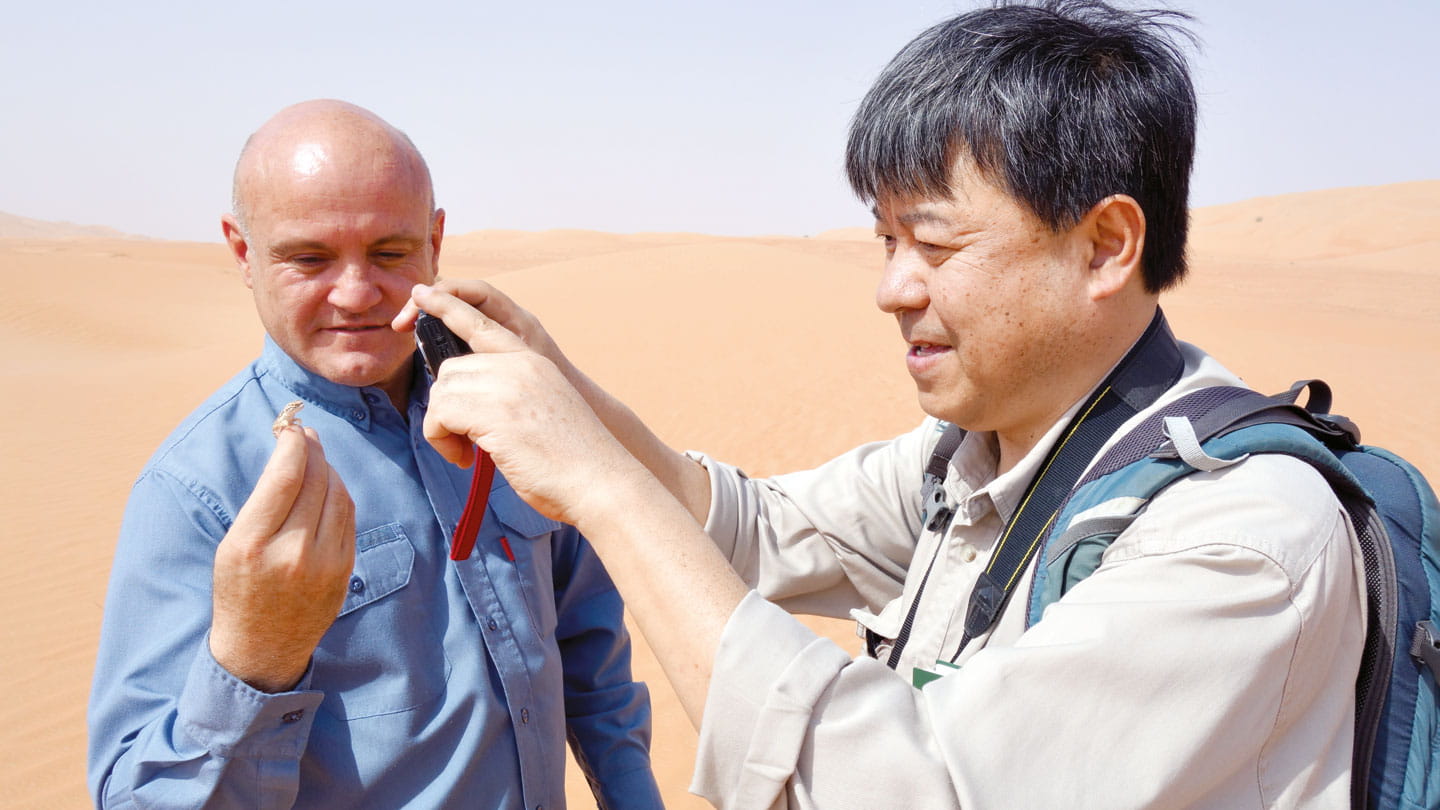Japanese dryland researchers visit Saudi Aramco

Yamanaka Norikazu takes a photo of an Arabian Toad-headed Agama at the Shaybah Wildlife Sanctuary.
Within the framework of Saudi Aramco's Corporate Social Responsibility (CSR), Aramco Asia Japan (AAJ) has partnered with Japan's Arid Land Research Center (ALRC), Tottori University in supporting their dryland research efforts in 2016.
Approved as the “Joint Usage/Research Center” by the Ministry of Education, Culture, Sports, Science and Technology, ALRC is the only institute in Japan specializing in dryland-related research, with some of their works receiving recognition globally.
Through AAJ, the center has established contact with the Environment Protection Department (EPD) at Saudi Aramco — a unit that has a long and established track record in the areas of effective management of sand and desert animals in the Kingdom.
Seeing is believing
The three-day program organized by EPD began with a meeting at Dhahran headquarters. The hosts presented their biodiversity protection and enhancement program while Yamanaka Norikazu, head of ALRC, described his project on afforestation along the roads in China, a subject of much interest for EPD as the Kingdom is facing similar challenges.
The EPD team headed by terrestrial ecologist Chris Boland organized field trips for the visiting Japanese delegation with the first trip to the recently inaugurated Shaybah Wildlife Sanctuary. EPD and Shaybah Producing Departmen specialists explained that three endangered species — Arabian oryx, Arabian sand gazelles, and ostriches — have been reintroduced at the sanctuary to help restore these animals within the Kingdom. “As an oil and gas company, Saudi Aramco's commitment to the environment is truly impressive,” Yamanaka said.
EPD also took the Japanese visitors to the mountainous area of Abha to observe traditional wheat production. Tsujimoto Hisashi of ALRC, a specialist in wheat production, had opportunities to interview local farmers and examined the local species.
“I had been interested in how the Middle East origin crops had propagated to East Africa. Our visit this time to the traditional cereal culture in Abha was out of the cultivation season, but I managed to find oats, bread wheat, and macaroni wheat — many of which the genetic types seem indigenous,” said Tsujimoto. “I should be able to collect further information by revisiting the area during the high season. I hope to build more knowledge on the Kingdom's agricultural policy to search for common ground that would lead us to some joint research in future.”
For ALRC, in spite of numerous studies overseas using their well-established network, Saudi Arabia was one place left unexplored until now, making this visit extremely special. “Seeing the red sand dunes of Shaybah, the vegetated valleys of the Asir Mountains, and the salty sabkhas was a dream come true … the plant species that exist in each location differed greatly. But there were also some familiar plants that I had seen before in the deserts of Asia, so I felt the connection between the Kingdom and East Asia through our deserts,” Yamanaka said.
“Combatting desertification is one of the greatest challenges facing people and companies in arid regions of the world. It is a global issue and requires a global effort to address it, so it is very valuable to learn from the experiences of the Arid Land Research Center, which has been studying desertification for decades across Asia and Africa,” said Chris Boland.
Sharing knowledge for tomorrow
Both ALRC and Saudi Aramco EPD hope to maintain this newly fostered relationship. Hopefully, there will be area of mutual interest and benefit in the future that would eventually result in improving a precious bond between humans and nature.
“I was pleased to hear that Saudi Aramco is thinking of critical issues such as greening along roads, and that idea is to plant local plant species, which is the modern global trend in restoring the natural environment,” said Tsujimoto.
“At ALRC, we have solid experience in data collection using drones, monitoring the activities of large animals, and using plants to manage moving desert sands. Some of these methods could be applied on a large-scale at particular Saudi Aramco projects to assist monitoring and management of the ecosystem,” Yamanaka said after his return to Japan.
“I am delighted and thrilled to see this bond between ALRC and AAJ, initiated in Japan, is now taking some potential shape and connecting its scope with the Kingdom. I am looking forward to seeing some form of a joint research materialized in the future by those professionals from both ends of Asia,” said AAJ representative director Anwar Hejazi.
